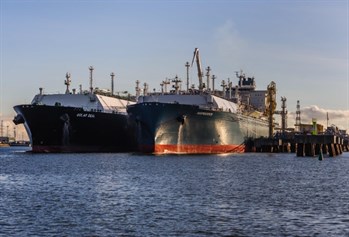Like Tesla did for autos, Germany's TES aims to be an energy disruptor
(Reuters) - Germany's Tree Energy Solutions (TES) plans to build the world’s largest portfolio of hydrogen projects by 2030 as it seeks to change "the old way of thinking about energy" just like Tesla did about autos, its newly-appointed CEO said.
TES, backed by Belgian firm AtlasInvest, is adopting new technologies involving using hydrogen to produce synthetic methane, which will be easier to transfer to the company's infrastructure that will be built in Europe and designed to produce no emissions and zero-leakage.
A hydrogen supply network could boost Europe’s energy security at a time the bloc is seeking to cut its reliance on Russia's pipelined natural gas following Moscow's invasion of Ukraine.

"It is like Tesla has been disrupting the old way of making and thinking about automobiles, we want TES to be disrupting the old way of thinking about energy," Marco Alvera, who was previously the CEO of Italian gas infrastructure group Snam, told Reuters in an interview.
He said the projects would involve billions of dollars.
The current concerns around hydrogen are that it is costly and difficult to transport as it requires much cooler temperatures than LNG and has flammability and leakage risks. Converting hydrogen to ammonia is one of the solutions to minimise risks.
For TES, the plans involve merging CO2 and hydrogen to create synthetic methane, which can be shipped to facilities in Europe, offering a cheap source of renewable energy with the estimated cost at $25 per megawatt/hour (MWh).
A barrel of oil costs around $70 per MWh, natural gas around $80/MWh, so while the capital expenditure may be very high, the operating expenses for hydrogen will be cheaper, he said.
"The world now agrees that hydrogen will be between 15 and 35% of the clean energy mix and this will require billions of dollars of investments in infrastructure," Alvera said.
The company is in talks with a number of potential producers in the Middle East and the Gulf region to use their existing LNG infrastructure to ship synthetic methane, TES co-executive chairman, Paul van Poecke, said.
He said that potential agreements could be announced by the end of 2022 or by early next year.
(Reporting by Marwa Rashad; Editing by Emelia Sithole-Matarise)

- RWE strengthens partnerships with ADNOC and Masdar to enhance energy security in Germany and Europe
- TotalEnergies and Mozambique announce the full restart of the $20-B Mozambique LNG project
- Venture Global wins LNG arbitration case brought by Spain's Repsol
- KBR awarded FEED for Coastal Bend LNG project
- Norway pipeline gas export down 2.3% in 2025, seen steady this year



Comments